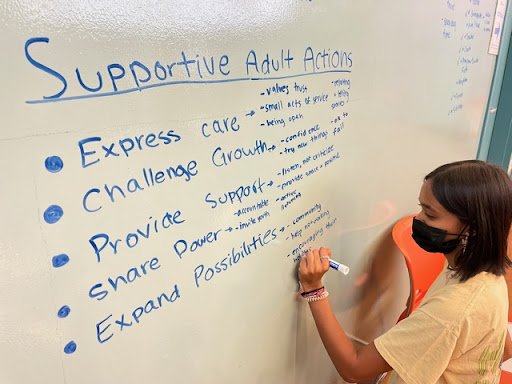
Workshops
YCS interactive workshops are designed for schools and community organizations that want to cultivate youth well-being, with a particular emphasis on creating supportive relationships between youth and their adult allies. All of our workshops are anchored in research and informed by young people’s lived experiences. While the workshop content is established from our extensive experience working with diverse groups of youth and adults, we work with each of our community partners to co-create the workshop experience that is right for your community.
Our workshops are typically hosted by a school or community organization and can be 60-90 minutes long. Our team can facilitate the workshops in person or virtually. Many of our workshops can be offered at low or no cost thanks to generous philanthropic support.
Would you like to bring one of YCS’s workshops to your school or organization?
Apply by clicking the button below.

CALL TO ACTION WORKSHOP
-
This workshop was developed in partnership with youth and aims at fostering positive youth and adult relationships.
“Support Youth: A Call to Action” is a workshop for adults, and will give participants an opportunity to interact with supportive actions identified by youth and to engage in conversations about youth mental health and wellness. This is a collaborative experience with the goal of strengthening relationships.
Grounded in evidence based research from Search Institute, this workshop will explore Search Institute’s Developmental Relationship Framework and identify specific, culturally relevant ways to apply the Framework elements
-
Participants will learn what youth have identified as supportive actions and how to use their own power to keep building positive relationships with youth. In addition, increasing awareness of the Developmental Relationship Framework (DRF) among adults.
-
1 hour workshop or 2 day workshop (1 hr each). In person / virtual. Available in Spanish. For adults and youth
-
Informative (1 day)
The general workshop version discusses the DRF to the community.
Staff Training (1 day or 2 days)
This version will provide discussion and objectives to implement in their workspace.
Youth Specific (2 days)
Day 1 Focus group is developed for youth in your community to discuss the DRF and collect data on what their specific needs are. Day 2 is an informative version for adults with information brought from youth focus group
-
Fill out the workshop interest form! We will reach out to you soon!
SAFETY FIRST: DRUG EDUCATION & INTERVENTION LESSONS
-
Safety First is a comprehensive drug education and intervention curriculum preventing and reducing use of all drugs. The purpose of all the curriculums is to encourage youth to abstain from use, but this curriculum also includes a clear harm-reduction message for youth who are experimenting or using, to provide students with scientifically accurate information to empower them to quit and/or reduce harm, should they choose to continue to use.
-
Educate and empower youth to make safe and healthy choices regarding substance use
Encourage youth not to use drugs in the first place
Encourage youth who are already using to stop or at least cut back or make alternative choices to reduce their risk
Provide straightforward, science-based information
Explore the real and perceived benefits and risks
Prioritize safety through personal responsibility and knowledge
-
Various single 60-minute minute sessions
In-person / Virtual
For middle school, high school and college students
In classroom or group settings
-
YCS has identified the following 3 lessons from this extensive curriculum:
(1) Keeping you safe, Reducing you harm: An Overview
Students will learn about harm reduction concepts and strategies, including ways to not use at all, that will empower them to make healthy choices for themselves and others regarding substance use.
(2) Stress, Coping, and Wellness
This lesson will review stress, discuss how to manage stress in a healthy way and to understand one’s own stress, understand and respond to stigma associated with drug use, and find ways to support a friend who is dealing with stress. The ultimate goal is to find ways to cope with stress without turning to drugs.
(3) Media Literacy: Understanding the Portrayal of Drugs
Students will learn foundational media literacy knowledge and be offered tools to help them make healthy and informed decisions. The goal of this lesson is to reduce harm through knowing good drug information and using media literacy skills.
YOUTH-DESIGNED WORKSHOPS
-
Students will identify an area of focus and will collaborate with YCS to develop and facilitate a research based workshop.
BOTVIN LIFE SKILLS ELEMENTARY WORKSHOPS
-
The Botvin LifeSkills Training Elementary School program is a comprehensive, dynamic, and developmentally appropriate substance abuse and violence prevention program designed for upper elementary school students. This highly effective curriculum has been proven to help increase self-esteem, develop healthy attitudes, and improve their knowledge of essential life skills – all of which promote healthy and positive personal youth development and mental health.
-
Personal Self-Management Skills
Students develop skills that increase self-esteem, enhance problem-solving skills, help them reduce stress and anxiety, and manage anger.
General Social Skills
Students gain skills to meet personal challenges such as overcoming shyness, communicating clearly, and building relationships.
Drug Resistance Skills
Students build defenses against pressures to use tobacco, alcohol, and other drugs.
-
30-50 minute class sessions
Taught once or twice a week
In person
Bilingual option for primary spanish speaking students
-
8 class sessions
Self-Esteem
Decision-Making
Smoking Information
Advertising
Dealing with Stress
Communication Skills
Social Skills
Assertiveness
All classes are required
-
Fill out the workshop interest form! We will reach out to you soon!
Interested in Hosting a Workshop?
Fill out the workshop interest form! We will reach out to you soon!





